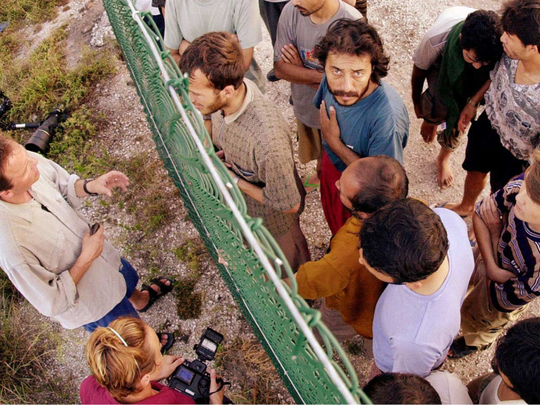
Last week, after 78 years of life in Australia — most of them happy and productive, the final few marred by dementia — Kurt Kuhn passed away. He was our grandfather. He was our father. He was loved deeply by his family. But years before we came into the picture he was, in the vernacular of the times, a “refo”.
At the age of nine he came to Australia from Vienna with his little sister and their parents. They were Jews fleeing the Nazis, and they arrived here by boat. In the years and months leading up to their escape, their home had turned against them. After the Nazi annexation of Austria, Kurt’s father Otto, a pastry cook and baker, had been humiliated on the streets of Vienna. He was thrown into a concentration camp for weeks in order to intimidate him and his family into leaving. It worked. To many Australians during the 1930s and 1940s, Central European Jews were foreign and strange. At least, in the days of the White Australia policy, they were pale. But they ate a peculiar food.
They were supposed to be miserly, clannish and alien. Such prejudices were common, especially in elite circles. Then, as now, wealth and power were often associated with self-satisfaction. Unless association with them brought personal advantages, people who were different were regarded as inferior or dangerous. After all, racism against Jews and especially against southern Europeans, after the Second World War, helped divide workers against each other and undermine union organisation and solidarity.
Although matzah balls and gefilte fish were regarded with the same suspicious attitude that some Australians have towards Halal Snack Packs today, there were foods from the old world that Australians ate with gusto — cakes and biscuits. Otto was a highly skilled pastry cook and baker and eventually set up a cake shop in Bondi. At school, Kurt also worked in the shop. Unlike most members of his generation, he went to university.
While studying chemical engineering, he still had to get up at 2am on Saturdays to help with baking. Kurt was thorough and precise. After university, he began a 40 year-long career at the Gas Company, eventually heading its laboratory as a senior technical manager. His family came to Australia to survive, make a life, get work and in doing so made significant contributions to Australian society.
The refugees on Manus and Nauru want to do the same. So do others who are keen to come to Australia.
Capitalism will always generate economic crises. Despite them, it is workers who generate social wealth. Working people — regardless of skin colour — do not “take” jobs, they create them. More workers mean more potential wealth. “Refo” was a straightforwardly racist, pejorative term.
The fascist fringe
Now Australian governments use more sophisticated language like “unlawful boat arrivals” and “asylum seekers” to denigrate refugees. The right-wing mass media and populist politicians both in and outside mainstream political parties, and the fascist fringe are cruder with their mendacious ravings about “queue jumpers”, “deliberate self-harm” and “threats to the Australian way of life”. Regardless of the terminology, the underlying racist logic is the same.
That logic led to the deaths of Omid Masoumali, Reza Barati, Fazel Chegeni, Hamid Kehazaei, Ali Ahmad Jafari, Reza Alizadeh and Mohammad Nasim Najafi. All died as a result of murder, medical neglect or suicide during detention or its aftermath. They were imprisoned in off and on-shore concentration camps set up, run and paid for by Australia.
Justified by hypocritical appeals to humanitarian motives, like the desire to prevent drownings at sea, our governments have used many of same repressive, violent and inhuman techniques as the regimes that refugees escaped from in the 1930s, and are still fleeing today.
The self-serving economic and political logic of Australia’s treatment of the children, men and women, who are hanging on interminably in camps has led to rape, other physically abuse, denial of healthy living conditions, the mental torture of being denied a future, and callous treatment by bureaucracies and individuals with authority. The Coalition and Labor are both committed to sustaining and intensifying racist attitudes to those currently imprisoned.
Now “boat people” largely means Muslims and Arabs. Portraying refugees as threatening bogiemen distracts attention from attacks on Australian living standards and civil rights. As in the post-war years, it divides workers and creates a false sense of unity with employers, in the face of contrived “security threats” at home and abroad.
Kurt, his parents and sisters only spoke German when they arrived in Australia in 1939, shortly before the outbreak of the war. Their presence did not endanger anyone in Australia. As a Jew, Otto’s previous nationality had been revoked. He was not Austrian or German. Like so many fleeing today, he and his family were outcasts. In Australia, as an “enemy alien” Otto had to report to the police weekly.
Compared with today’s security paranoia about refugees, and their persecution by Australian governments, that war-time foolishness looks trivial. Neither Central European Jews on the run from Adolf Hitler nor refugees seeking haven in Australia today are threats. In 78 years, when the lives of the children we’re currently detaining have blossomed and faded, do Australians want to look back, as their families have this past week, in awe at their contributions?
The alternative is to reflect aghast at the wastefulness, at the way fear and ignorance so many years ago caused Australians to destroy such wonderful, human potential.
— Guardian News & Media Ltd
Alyx Gorman is the editorial director of Time Out Australia, and the fashion editor of the Saturday Paper. Dr Rick Kuhn is an adjunct reader in Sociology at the Australian National University.








